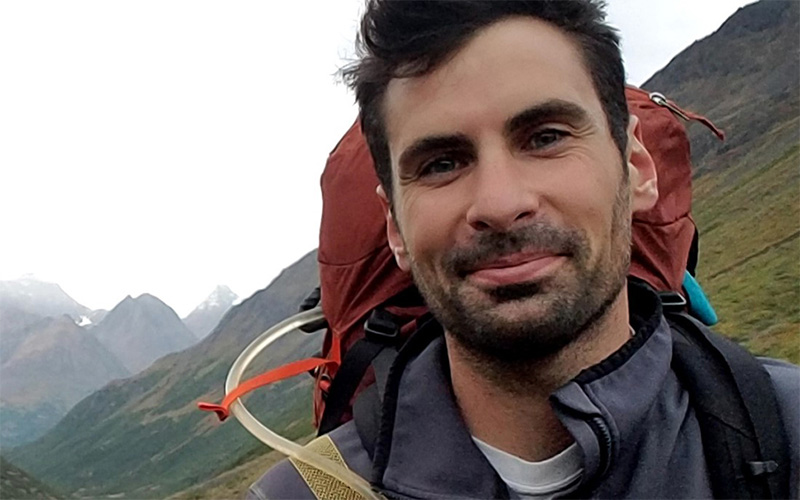
Ken Burkart: Learning the Ropes
Ken Burkart, '20, applied the discipline and determination of rock-climbing to his academic career and his research into aquatic chemistry.
This Section's arrow_downward Theme Info Is:
- Background Image: ""
- Theme: "light-theme"
- Header Style: "purple_dominant"
- Card Height Setting: "consistent_row_height"
- Section Parallax: ""
- Section Parallax Height: ""
Learning the ropes in any area takes balance and flexibility. You start with the basics to create a solid foundation, and then practice the techniques to master them. Eventually things will get easier. In rock climbing as in school, recent UW Tacoma graduate Kenneth Burkart points out, when you “keep showing up and working hard, you’re going to get better.”
Burkart’s route to an undergraduate degree took a detour as he pursued a career as a professional rock climbing resetter in his twenties, traveling throughout the U.S. to climb, guide and teach. He eventually landed in St. Louis, where he worked with a coach and pursued advancement opportunities in the climbing industry, while managing a climbing gym. But as he approached his thirties, he started to feel the aches and pains associated with the physically demanding sport he was so passionate about. After a ten-year gap from community college, Burkart decided it was finally time to complete an undergraduate degree, and he enrolled as a transfer student at UW Tacoma.
Balancing the rigors of school with a part-time climbing career was initially a struggle for Burkart. He admits he wasn’t fully prepared for the workload, had to brush up on his math, and took chemistry twice. But the mental acuity and attitude of determination required in climbing informed his academic approach, and Burkart soon found his way with balance and flexibility, by starting with the basics to create a solid foundation, knowing things would get easier.
“That really helped me get through barriers,” said Burkart. “Taking big falls and taking risks that were calculated risks where I knew in the back of my head, I’m going to be fine, I did all the right safety steps, I got all the right partners in training. So, getting through that barrier and not listening to that voice that tells you to give up, ... that was a huge mental training.”
One of Burkart’s partners in academic training was Jim Gawel, associate professor of environmental chemistry and engineering. One day on campus, Burkart happened to pass by Gawel, whom he knew from the rock-climbing community and the Tacoma Mountaineers. They stopped to talk and catch up. “Eventually he asked if I was interested in doing a summer undergraduate research internship at Mount St. Helens,” Burkart said. He joined Gawel at Spirit Lake, looking at the nutrient cycle and how the lake and surrounding environs have changed over time since the eruption in 1980. “I was doing some science and Jim’s a great mentor of course, so we had a really good time with that,” said Burkart.
Gawel offered Burkart another opportunity through his research on arsenic and lakes. “I learned a ton about aquatic chemistry and all sorts of things I didn’t know were there,” he said. “And because of my experiences through that, more doors were opened to me. We went to some different conferences involving lakes and things like that. So, it’s been good to network and talk to people.”
In the Spring of 2020, Burkart completed a bachelor's degree in environmental science. “Being outdoors and climbing and just being around other outdoor-conscious people and having grown up in scouting and gone through the program … I was very aware of environmental issues.” The environmental science degree also appealed to Burkart because it offered a lot of flexibility wherever he decided to go after graduating. He is now finishing up the project studying arsenic in lakes, as well as an internship with the City of Federal Way to perform water quality testing and GIS mapping.
One of the most exciting projects Burkart is now working on has to do with storm water remediation for the City of Tacoma at Wapato Lake. The project aims to address toxic algal blooms and clean up the water, improving the overall health of the lake. “This pilot project’s goal is to see if we can pull enough of those nutrients out over time with this growth scrubber to see if it’s a low cost, long-term solution,” said Burkart.
His love for the outdoors and respect for the environment have come full circle for him with the Wapato Lake project. “A lot of the other projects I’ve done are analyzing and looking at how the toxins move through the environment, but not cleaning it up,” he said. “So, that’s been a really good mental boost. The reason I got into environmental science is to do something about the issues.”
This Section's arrow_downward Theme Info Is:
- Background Image: "background-image: url('/~jamesini/uwtd8main_staging/web/sites/default/files/2020-12/uwtnews-d8-alumni-classof2020-featureimage.jpg');"
- Theme: "light-theme"
- Header Style: "purple_dominant"
- Card Height Setting: "consistent_row_height"
- Section Parallax: ""
- Section Parallax Height: ""
Recent news
Main Content
Gathering Strength
News Tags on this arrow_upward Story:
- None
Main Content
UW Tacoma Enrollment up 4% for Autumn 2024
News Tags on this arrow_upward Story:
- None
Main Content
Celebrating First Gen
News Tags on this arrow_upward Story:
- None



